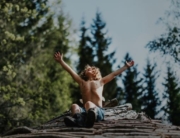Whether or not you’re familiar with the late philanthropist Douglas Tompkins, it feels like we’re all unwittingly indebted to his contributions. An avid outdoorsman, conservationist, and entrepreneur, Tompkins oversaw massive clothing brands like Esprit and the North Face, revolutionizing the outdoor recreational industry into what we know today. More important, he created and expanded national parks to preserve land at a time when our modern climate crisis was barely a blip on any government’s radar. And above all, Tompkins was a loving husband.
Love is the central theme of Wild Life, a sprawling, but intimate documentary about Tompkins’s life from directors Elizabeth Chai Vasarhelyi and Jimmy Chin (Free Solo) in collaboration with his second wife, Kristine (“Kris”) Tompkins. He died in 2015 of hypothermia following a tragic kayaking incident, but left behind a legacy driven by the desire to love, to explore, to innovate, and crucially, to protect a world whose natural beauty remains under assault. Consider Wild Life a love story on two fronts: as much about Doug’s love for Kris as well as the mission they undertook together as environmental patrons.
Told through a combination of archived video footage, interviews, and cinema verité, Wild Life examines Doug and Kris’s backstories and how their fascination with the outdoors built an eco-agenda. The duo hailed from opposite corners of America: Doug, an East Coast native who shunned college to move out west and pursue rock climbing; Kris, a California surfing enthusiast. Both were active in the outdoor apparel industry. Doug founded the North Face with his then-wife Susie Tompkins Buell; Kris worked at climber-turned-businessman Yvon Chouinard’s then-budding Patagonia, Inc., eventually becoming its first CEO. The two met each other through Chouinard in the early 1990s and married soon after and turned their interests to conservation efforts in Chile and Argentina despite mass skepticism from various South American geopolitical factions.
The filmmakers’ approach to telling this love story is somewhat unique, beginning with news of Doug’s death before rewinding the clock and exploring their lives individually. We don’t even learn how he and Kris met until close to the film’s midpoint. Instead Vasarhelyi and Chin devote this time to exploring Doug’s way of thinking as a business mogul who rejected his status to embrace a deep ecology lifestyle; a man who took a van trip down to Patagonia and, with his friends, spent 60 days scaling one of the region’s tallest mountain peaks (more than half of which involved finding shelter in an ice cave). Vasarhelyi and Chin’s footage doesn’t take any creative risks—in terms of plotting, this is rather rudimentary for a biographical documentary. But the collection of interviews, from Chouinard—who, like Tompkins, sold his billion-dollar company in an effort to fight climate change—to former Chilean President Michelle Bachelet, stand out from the pedestrian structure. As Chouinard puts it, understanding Tompkins’s entrepreneurial spirit lies in the mindset of a juvenile delinquent: You don’t like something, you go off and do it on your own.
Calling Doug unorthodox would be putting it lightly. After all, this is an American man who bought more than 700,000 acres of South American rainforest just to give it back to the people as Pumalín Douglas Tompkins National Park, a move whose altruism, especially as a foreigner, seemed unbelievable to ordinary residents, politicians, and capitalist interest groups alike. Wild Life only briefly focuses on these detractors and their batty theories, treating them as temporary obstacles at best and springboards to explain Doug and Kris’s conservation plans at worst. His endeavors included not just buying land, but rewilding ecosystems, forming alliances with governments, and taking a public stand against ecological injustices. Injustices that, in a world of rampart deforestation and overpopulation, feel quite prescient.
Vasarhelyi and Chin succeed in making Doug’s life, his feelings for Kris, vivid, right down to their cute nicknames, Birdy and Lolo. When Wild Life finally gets to the tragic circumstances of his death, it does feel like a giant has been taken from this world. The loss devastates his friends and colleagues, and especially his wife, whose grieving process is heavily documented. I certainly wouldn’t argue that more people should live as Douglas Tompkins did—his adventurous lifestyle is hard to replicate—but it’s a satisfactory life in retrospect, one that made him both a lover and a fighter.







Leave A Comment